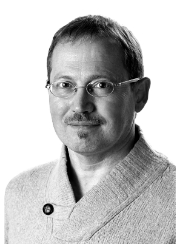Joaquim Matias Espona (Barcelona,1967) is Full Professor at Universitat Autònoma de Barcelona since 2018. He is currently the Head of the TH-Division at UAB and IFAE. He obtained his PhD in Theoretical Physics in 1995 at UB. He spent five years as postdoctoral researcher at Dipartimento di Fisica Galileo Galilei di Padova (1995-1997), SISSA (1997), TH-Division at CERN (1997-1999) under a Marie Curie fellowship and ITP (Aachen) under a BatIIa (2000). He was also awarded a Ramón y Cajal, an I3 and an Explora Project. He has been appointed by EC as an Expert for the Research European Agency since +10 years (from 7th Framework to Horizon 2020) and also by SNSF (Switzerland), UK Research Council, ANR (France), FWF (Austria) and ANEP. He is Scientific Guarantor of IFAE’s Severo Ochoa, author of 84 publications with h=36 and an average of +150 citations/published paper since 2013. He gave +100 talks, organized 8 conferences and published outreach at IyC and Inference Magazine.

Joaquim Matias Espona
ICREA Academia 2018
Universitat Autònoma de Barcelona · Experimental Sciences & Mathematics

Research interests
Uncovering the first properties of the fundamental theory that will supersede the SM of particles constitutes the main goal of his research. He has been a main contributor to the highly successful Flavour Physics program, a field at the forefront of particle physics in the search for New Physics. He is interested in testing the Flavour Precision Frontier that gives us access to energy scales not accessible to direct probes. His research on rare B meson decays is contributing to an exceptionally exciting period concerning what is called “flavor anomalies”. The outcome of his work has pointed out some of the most promising evidences of New Physics found at LHC up to now. Intensive theoretical and experimental work is ongoing to confirm/disprove these indications. He is focused on exploring the limits of the SM to answer the questions left open by this theory using the forthcoming results of the LHCb and Belle II experiments and those of the high-luminosity phase at LHC.
Keywords
Theoretical Particle Physics, Flavour Physics, Rare B decays, New Physics.